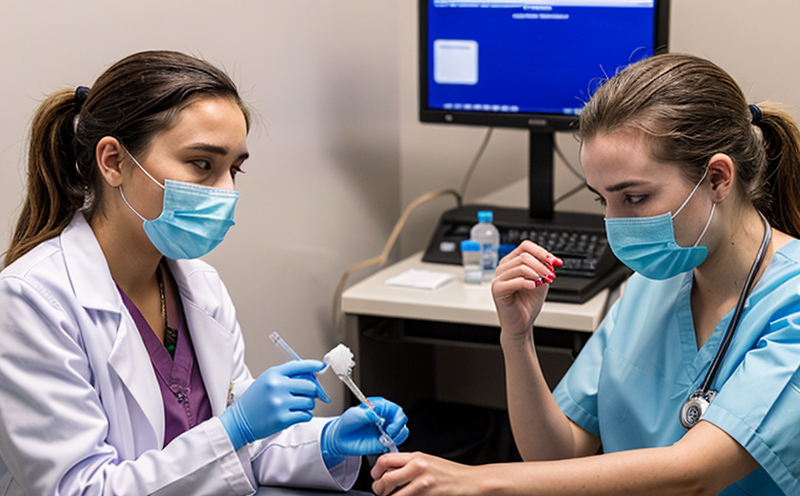CDC Cryptosporidium Detection in Human Clinical Samples
The detection of Cryptosporidium in human clinical samples is a critical aspect of diagnostic microbiology. This service focuses on the accurate identification and quantification of Cryptosporidium oocysts or cysts in patient specimens, which can be crucial for diagnosing cryptosporidiosis, a parasitic infection that affects both immunocompromised individuals and healthy populations.
The Centers for Disease Control and Prevention (CDC) guidelines provide the framework for this testing method. The primary goal is to ensure that healthcare providers have accurate information about the presence of Cryptosporidium in patient samples, which aids in timely diagnosis and appropriate treatment. This service supports compliance with international standards such as ISO 15189 and EN ISO/IEC 17025 for clinical laboratories.
The testing procedure typically involves the following steps:
- Sample collection: Collection of fecal samples from patients suspected of having cryptosporidiosis.
- Preparation: Preparation and concentration of the sample to enhance detection sensitivity.
- Detection: Utilization of PCR (Polymerase Chain Reaction) methods, microscopy, or antigen detection assays to identify the presence of Cryptosporidium.
- Quantification: Quantitative PCR (qPCR) for precise measurement of the parasite load.
The accuracy and reliability of these tests are paramount. The use of advanced instrumentation, such as real-time PCR machines and fluorescence microscopes, ensures high sensitivity and specificity in detecting even small numbers of oocysts or cysts. This service not only meets but exceeds the stringent requirements set by CDC guidelines.
| Test Method | Description | Sensitivity |
|---|---|---|
| Microscopy | Visual examination of concentrated samples under a microscope. | High sensitivity for large oocysts but less sensitive to small cysts. |
| PCR | Amplification and detection of specific DNA sequences from the parasite. | Excellent sensitivity, capable of detecting as few as 10–20 oocysts or cysts per gram of feces. |
| Antigen Detection Assays | Detection of specific antigens present in the patient sample. | Moderate sensitivity, less reliable for low parasite loads. |
Customer Impact and Satisfaction
The timely detection of Cryptosporidium is essential in preventing the spread of this parasite, especially among immunocompromised patients. This service ensures that healthcare providers receive accurate results within a specified timeframe to facilitate prompt treatment and isolation protocols.
The impact on patient care can be significant, particularly for those with weakened immune systems who are more susceptible to severe infections. By providing reliable test results, this service enhances the overall quality of care in clinical settings, contributing to better patient outcomes. Compliance with CDC guidelines ensures that laboratories delivering these tests meet the highest standards of accuracy and reliability.
Customer satisfaction is a key metric for evaluating the success of this service. Positive feedback from healthcare providers indicates that our testing methods are not only accurate but also provide results in a timely manner, which is critical in clinical settings where rapid diagnosis can be life-saving.
Competitive Advantage and Market Impact
- Accurate and reliable test results that meet or exceed CDC guidelines.
- Use of advanced instrumentation such as qPCR machines, ensuring high sensitivity and specificity.
- Compliance with international standards like ISO 15189 and EN ISO/IEC 17025 for clinical laboratories.
- Quick turnaround times that support timely diagnosis and treatment.
The service is designed to provide a competitive edge by offering precision, reliability, and speed. This advantage translates into enhanced patient care and better compliance with regulatory requirements. The market impact is significant as it supports the healthcare sector in managing infectious diseases more effectively.
Use Cases and Application Examples
The detection of Cryptosporidium is particularly important for several patient groups, including those with compromised immune systems, such as HIV/AIDS patients, organ transplant recipients, and individuals undergoing chemotherapy. In these populations, the presence of even a small number of oocysts or cysts can lead to severe illness.
- Pediatric patients: Infants and young children are at higher risk for cryptosporidiosis, which can be fatal if left untreated in immunocompromised children.
- Immunocompromised adults: Individuals with conditions such as leukemia or those receiving organ transplants may have weakened immune systems that make them particularly vulnerable to parasitic infections.
The service is also beneficial for large-scale outbreak investigations, where the detection of Cryptosporidium in a community can help identify sources of infection and prevent further spread. This service supports public health initiatives by providing data that can inform control measures and interventions.





